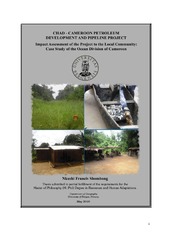Chad-Cameroon petroleum development and pipeline project. Impact assessment of the project to the local community: Case study of the Ocean Division of Cameroon
Master thesis
Permanent lenke
https://hdl.handle.net/1956/4426Utgivelsesdato
2010-05-18Metadata
Vis full innførselSamlinger
- Department of Geography [634]
Sammendrag
The Chad-Cameroon petroleum development and pipeline project was received with great expectations. Though the project presented negative effects to the environment, with the pro-posed mitigation strategies, many people saw it as a path to help improve their livelihoods through proposed compensations, provision of health facilities, school, drinkable water, and an opening for job opportunities. The Bakola on their part where promised better housing, improvement in their health situation, possibilities to encourage them to be more farmers than hunter and gatherers, recognition of their civil status and also encourage the Bakola to leave the forest and integrate into the wider society.With the completion of the pipeline project in 2004, this thesis tries to assess the impacts of the project to the people of the Ocean Division since its completion. With the project being officially publicized as beneficial to the people of Cameroon, the affected communities are claiming a myriad of negative impacts and if any, some few positive impacts to these com-munities. While the villagers are claiming lost of livelihood sources and unfair compensation, some Bakola are praising the project for having provided them with houses and some items, while most of the Bakola are attributing their lost of livelihood sources (hunting and gather-ing) partly to the effects of the pipeline project in opening up the forest.
Utgiver
The University of BergenOpphavsrett
The authorCopyright the author. All rights reserved
